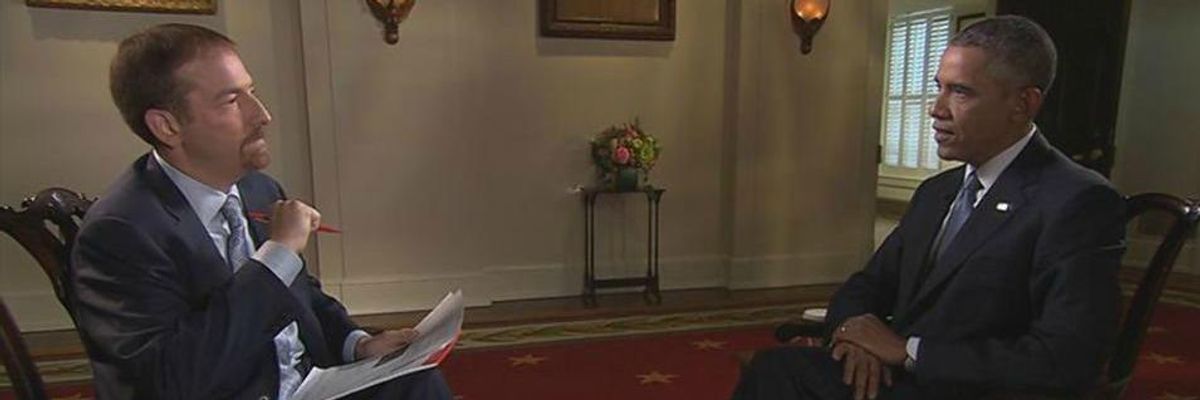

SUBSCRIBE TO OUR FREE NEWSLETTER
Daily news & progressive opinion—funded by the people, not the corporations—delivered straight to your inbox.
5
#000000
#FFFFFF
To donate by check, phone, or other method, see our More Ways to Give page.


Daily news & progressive opinion—funded by the people, not the corporations—delivered straight to your inbox.

When it comes to asking hard questions about war, don't count on the corporate and mainstream press, new study finds. (Image: MSNBC/screengrab)
While Congress may soon debate the ongoing US wars in Iraq and Syria, a new FAIR study shows that at the critical moments leading up to the escalation of US military action, mainstream media presented almost no debate at all.
The study of key TV news discussion programs from September 7 through 21 reveals that guests who opposed war were scarce.
The study evaluated discussion and debate segments on the Sunday talk shows (CNN's State of the Union, CBS's Face the Nation, ABC's This Week, Fox News Sunday and NBC's Meet the Press), the PBS NewsHour and a sample of cable news programs that feature roundtables and interview segments (CNN's Situation Room, Fox News Channel's Special Report and MSNBC's Hardball).
The key findings:
The study period covered what should have been a moment of serious debate: From the release of ISIS video beheadings of two American journalists through Obama's September 10 televised address and right up to the first US airstrikes on Syria.
But the question of whether to launch attacks was hardly worth debating. As MSNBC host Chris Matthews put it (9/9/14), "When it comes to down to how we fight this, everybody seems to be for air attacks, airstrikes. Everybody is for drone attacks."
One would definitely get that impression from the narrow debate in elite media.
The study appears in the November issue of FAIR's magazine Extra!
Trump and Musk are on an unconstitutional rampage, aiming for virtually every corner of the federal government. These two right-wing billionaires are targeting nurses, scientists, teachers, daycare providers, judges, veterans, air traffic controllers, and nuclear safety inspectors. No one is safe. The food stamps program, Social Security, Medicare, and Medicaid are next. It’s an unprecedented disaster and a five-alarm fire, but there will be a reckoning. The people did not vote for this. The American people do not want this dystopian hellscape that hides behind claims of “efficiency.” Still, in reality, it is all a giveaway to corporate interests and the libertarian dreams of far-right oligarchs like Musk. Common Dreams is playing a vital role by reporting day and night on this orgy of corruption and greed, as well as what everyday people can do to organize and fight back. As a people-powered nonprofit news outlet, we cover issues the corporate media never will, but we can only continue with our readers’ support. |
While Congress may soon debate the ongoing US wars in Iraq and Syria, a new FAIR study shows that at the critical moments leading up to the escalation of US military action, mainstream media presented almost no debate at all.
The study of key TV news discussion programs from September 7 through 21 reveals that guests who opposed war were scarce.
The study evaluated discussion and debate segments on the Sunday talk shows (CNN's State of the Union, CBS's Face the Nation, ABC's This Week, Fox News Sunday and NBC's Meet the Press), the PBS NewsHour and a sample of cable news programs that feature roundtables and interview segments (CNN's Situation Room, Fox News Channel's Special Report and MSNBC's Hardball).
The key findings:
The study period covered what should have been a moment of serious debate: From the release of ISIS video beheadings of two American journalists through Obama's September 10 televised address and right up to the first US airstrikes on Syria.
But the question of whether to launch attacks was hardly worth debating. As MSNBC host Chris Matthews put it (9/9/14), "When it comes to down to how we fight this, everybody seems to be for air attacks, airstrikes. Everybody is for drone attacks."
One would definitely get that impression from the narrow debate in elite media.
The study appears in the November issue of FAIR's magazine Extra!
While Congress may soon debate the ongoing US wars in Iraq and Syria, a new FAIR study shows that at the critical moments leading up to the escalation of US military action, mainstream media presented almost no debate at all.
The study of key TV news discussion programs from September 7 through 21 reveals that guests who opposed war were scarce.
The study evaluated discussion and debate segments on the Sunday talk shows (CNN's State of the Union, CBS's Face the Nation, ABC's This Week, Fox News Sunday and NBC's Meet the Press), the PBS NewsHour and a sample of cable news programs that feature roundtables and interview segments (CNN's Situation Room, Fox News Channel's Special Report and MSNBC's Hardball).
The key findings:
The study period covered what should have been a moment of serious debate: From the release of ISIS video beheadings of two American journalists through Obama's September 10 televised address and right up to the first US airstrikes on Syria.
But the question of whether to launch attacks was hardly worth debating. As MSNBC host Chris Matthews put it (9/9/14), "When it comes to down to how we fight this, everybody seems to be for air attacks, airstrikes. Everybody is for drone attacks."
One would definitely get that impression from the narrow debate in elite media.
The study appears in the November issue of FAIR's magazine Extra!